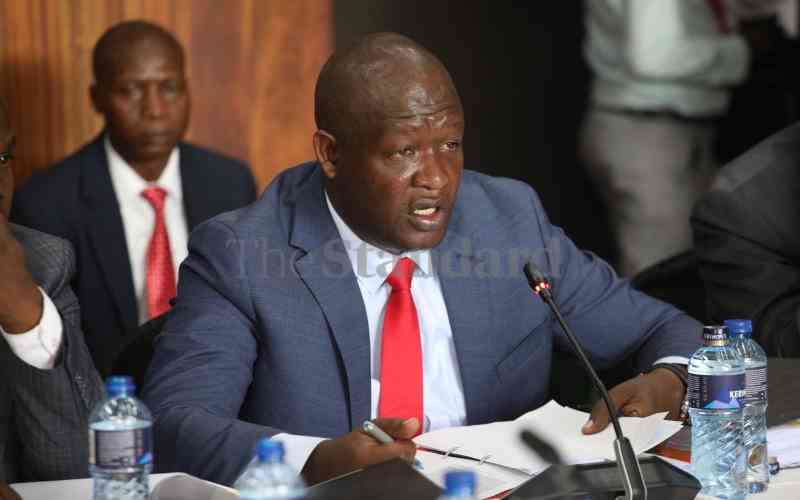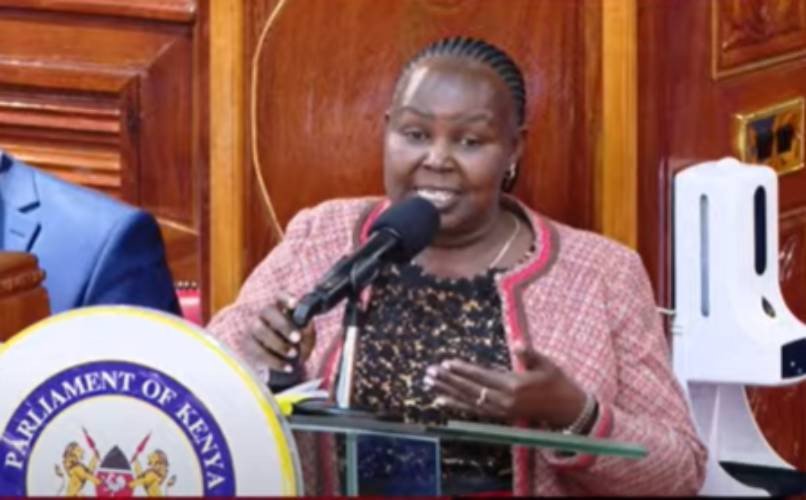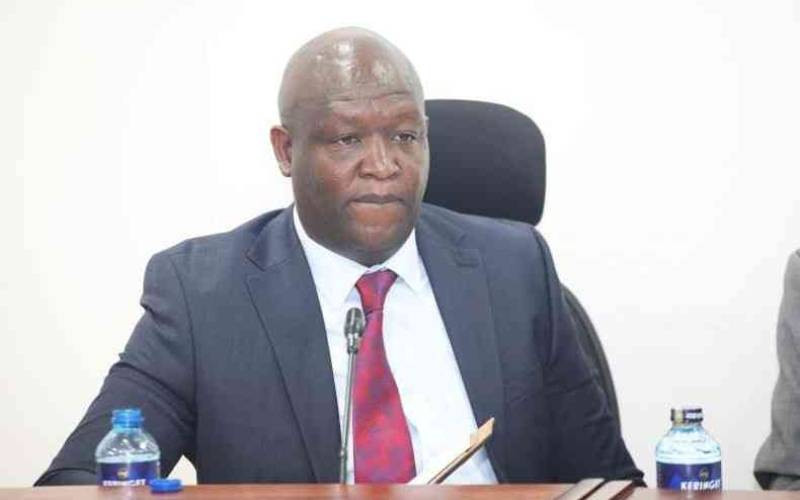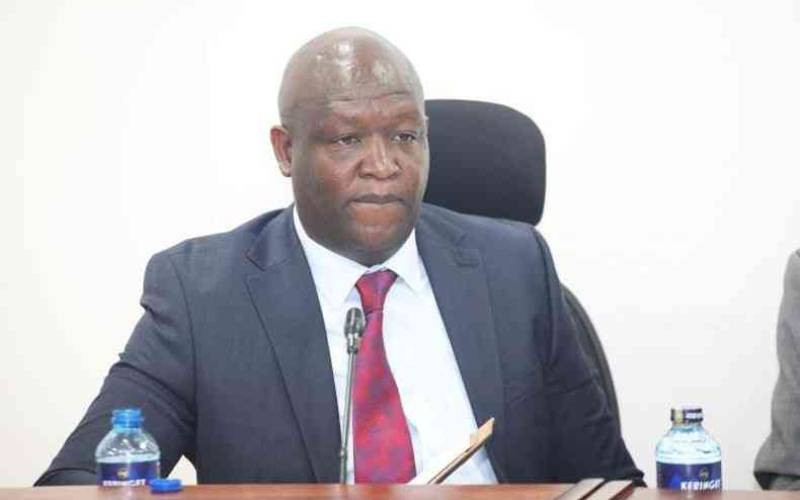Impeachment Showdown: Governor Mutai Fights For Political Survival

Kericho Governor Erick Mutai is currently embroiled in a high-stakes impeachment battle in the Senate, marking a significant challenge to his political career which saw him rise from an underdog university lecturer to win office in 2022. The core of the Senate proceedings has centered on the integrity of the electronic voting system used by the Kericho County Assembly to impeach him, coupled with a series of corruption allegations.
The impeachment motion, sponsored by Sigowet MCA Kiprotich Rogony, was heard in the Senate, where Governor Mutai's defense team, led by lawyer Katwa Kigen, fiercely challenged the credibility of the voting process. Kigen asserted that the impeachment was 'riddled with irregularities,' claiming the system was 'deficient and manipulated.' Concerns were raised that MCAs received login credentials via SMS using only their ID and payroll numbers, without secure passwords, which allegedly made the system vulnerable to impersonation and manipulation. Rogony, however, denied allegations of logging in for a colleague or offering bribes, including a purported Sh200,000 and foreign trips for an affidavit, insisting he is a Seventh Day Adventist and does not drink, unlike the 'drunk' sounding voice in an audio clip presented.
Further scrutiny of the technological systems intensified during the proceedings. The defense presented evidence on Wednesday, August 27, 2025, suggesting that three MCAs allegedly voted more than once and that one Internet Protocol (IP) address was used to vote nine times. Documents tabled indicated the online voting system, which was accessible via an internet-enabled mobile phone, lacked prior verification by the Speaker and Clerk regarding MCAs' internet access and devices. Notably, four MCAs—Amos Kimutai Birir (Kapkatet Ward), Chepkirui Edna Tonui, Bosuben Kibet Hillary (Cheplanget Ward), and Martin Kiplangat Cheruyot (Kapkugerwet Ward)—who opposed the impeachment, reportedly lacked internet connectivity on the voting date but were still recorded as having participated. These discrepancies led the defense to seek the termination of the trial, arguing that with four members opposing, the required two-thirds threshold of 32 out of 47 MCAs was not met.
During cross-examination, Kericho County Assembly IT expert Alfred Korir faced senators' questions about the 'porous' system, the exact number of affirmative votes, and the lack of prior testing. Korir admitted that anyone with an MCA's payroll and ID information could have accessed the system. He attributed the multiple uses of one IP address to the chamber's static Wi-Fi, which multiple devices could connect to. However, he could not confirm if the four dissenting MCAs personally voted, stating verification could only come from the members themselves.
In response to the mounting concerns, Senate Speaker Amason Kingi directed the Office of the Clerk to enlist two independent ICT experts from the ICT Authority of Kenya to audit the voting system. These experts were tasked with submitting a report by 6:00 p.m. on Thursday, August 28, 2025, to determine if an electronic voting process occurred, if the number of votes was verifiable, if proxy voting was possible, the exact number of affirmative votes, and any evidence of compromise.
The ICT Authority's report, presented on Friday, August 29, 2025, delivered a significant blow to the governor's defense by giving the electronic system a 'clean bill of health.' The report confirmed that an electronic voting process took place and that 33 MCAs voted in favor of the ouster motion, thereby meeting the required threshold. It unequivocally stated that it was impossible for any other person to vote on behalf of an MCA, and found no evidence of multiple voting, compromise, or impropriety in the system. The report detailed that the system, developed in-house and managed by Alfred Kimutai Korir, was hosted off-premise, outside the country, and went into production on August 12, 2025, in preparation for the vote.
Despite the report's findings, a section of the 18 MCAs who opposed the motion testified about their experiences. Nominated MCAs Irene Chebet and Bavina Chepkirui Serem claimed they lacked internet access or abstained but were recorded as having participated or faced attempts to have their seats declared vacant. They expressed distrust in the system, citing its rushed implementation and rumors of compromise. The prosecution, led by Elisha Ongoya and Elias Mutuma, countered by asserting that the electronic voting system was provided for by County Assembly standing orders, approved by MCAs themselves. They questioned dissenting MCAs' claims of lacking internet-enabled devices while being active on WhatsApp, suggesting inconsistencies.
Concurrently, Governor Mutai vehemently defended himself against corruption allegations. He dismissed claims of misappropriating Sh351 million meant for the National Agricultural Value Chain Development Programme (NAVCDP) as 'erroneous and sensational,' stating the actual amount was Sh281 million and that donor-controlled funds were audited and implemented by third parties without complaint. He also denied involvement in alleged fictitious procurement of Sh14.9 million goods, insisting all items were delivered prior to payment with supporting documentation. Regarding accusations of skewed and nepotistic appointments, Mutai clarified that hiring authority rests with the County Public Service Board, and appointments like Ms. Chepkirui Mercy's were based on merit through a transparent process. He maintained that the impeachment motion was 'false, brought in bad faith, and driven by ulterior motives.'
Erick Mutai's political journey began as a former university lecturer who, with his 'Equaliser' brand and a low-budget campaign, unseated established rivals like Charles Keter in the 2022 United Democratic Alliance (UDA) primaries, eventually winning the Kericho governorship. His tenure has not been without controversy, including a public spat with his Deputy Governor Fred Kirui in June 2023 and allegations of irregular handling of a Sh9 million Londiani crash victims' fund, which he disputes. This is the second impeachment attempt against Mutai; an earlier motion in October 2024 was terminated by the Senate after upholding a preliminary objection. With the ICT Authority's report presented, the Senate is now poised to make a final vote on Governor Mutai's fate.
You may also like...
F1 Shocker! Red Bull Star Stripped of Italian Grand Prix Victory After Dramatic Race Blunder

The Italian Grand Prix at Monza delivered a mix of record-breaking triumphs and dramatic incidents. Max Verstappen secur...
Chaos Erupts! Serbia vs England Match Marred by Fan Fights, Lasers, and Stadium Incidents

England's commanding 5-0 victory over Serbia in a World Cup qualifier was overshadowed by numerous crowd disturbances, i...
Hollywood Legend Michael Caine, 92, Ends Retirement for Vin Diesel's Action Sequel

Veteran actor Sir Michael Caine, aged 92, is set to come out of retirement to star alongside Vin Diesel in a sequel to “...
Charlie Sheen's Shocking Netflix Doc Explores Wild Revelations & Comeback Hopes

Charlie Sheen's new two-part Netflix documentary, “aka Charlie Sheen,” chronicles his tumultuous life, from his rise to ...
MTV VMAs 2025 Shocker: Tyla's Historic Win, Full List of Winners, Performers & Presenters Unveiled!

The 2025 MTV Video Music Awards crowned Lady Gaga as the night's big winner, taking home multiple trophies including Art...
Holy Ten's War with Mnangagwa's Son Ignites: Death Dares and Terrorist Accusations Unleashed

Zimbabwean hip-hop artist Holy Ten has launched a scathing attack on President Emmerson Mnangagwa's sons, Collins and Se...
Scandal Erupts: Alexander Brothers Face Mounting Assault Allegations

The Alexander brothers, luxury real estate moguls, face sex trafficking and sexual assault charges from over 60 alleged ...
Rock Legends Unite: Oasis Reunion Tour Ignites Legal Battles and Fan Frenzy!

The iconic band Oasis has reunited for a highly anticipated world tour in 2025, bringing original members back together ...
)


